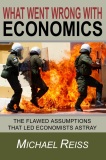IMHO the conventional view is badly wrong and
here's why:
Most people would make two assumptions when
considering this market:
- People buy shares with their money.
- If they spend say, £1000 on shares, they will have £1000 less money to spend on other things.
If both these things were true, then share
prices may stand a chance of being well behaved and act in the way textbooks
may have you believe. But many economists have observed that share prices
behave in strange ways. At least part of the reason for this is the fact that
neither of the two assumptions is correct. They are incorrect because shares
are often purchased with borrowed
money, or to be more accurate, part borrowed. Readers of this blog should know
by now, that when £1000 is “borrowed” from a bank, that money is created on the
out of nothing. There is nobody else
in the economy that is deprived of £1000 of spending power. You should get the
idea straight away that now something is screwy about the demand side of the
supply and demand balance.
Textbooks say that the price of something
is what you are willing to give up in order to get something, i.e. the amount
of money you will pay for something equals the amount of money you are willing
to have disappear from your spending power. But if you are going to buy that
thing with 10% your money and 90% borrowed
money (a process known as trading on margin) then the textbook concept is
busted. Now the amount of money you are willing to pay for something is, instead,
enormously sensitive to the interest rate you will be charged for the money you
borrow to buy that something.
So now the role of government/central
banks, becomes crucial in setting share prices! Instead of standing at the
side-lines observing these wise investors analysing the companies, the
government is now the dominating factor. If they lower interest rates, then the
enthusiasm for borrowing to buy shares increases and their price will rise… and
conversely If they raise interest rates, then the enthusiasm for borrowing to
buy shares decreases and their price will fall.
By implementing super-low interest rates
for such a long time, the government is now stuck in a situation, where
returning to normalised interest rates would almost certainly cause a fall (or
even crash) in the stock market. Note that I could have made almost exactly the
same argument about the housing market too.
The near-zero interest rate policy is in
force precisely because of fractional reserve banking and would be entirely
unnecessary had we a full reserve system.
Changing to full reserve banking is a key
ingredient for making our economy work properly.




